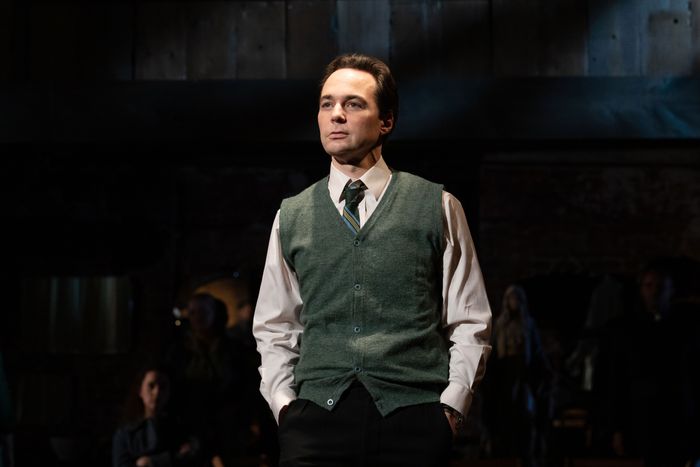
If you see Mare Winningham in a coat onstage, you’re probably going to mist up. It’s just one of those rules of Off Broadway theater. She excels in miniature wistfulness, sketching characters who seem just a little sad — and, given the coat, probably just a little cold. So when she appears in A Man of No Importance, badgering her brother, Alfie, played by Jim Parsons, to settle down with a nice girl, you experience the comfortable sensation of knowing you’re about to have your heartstrings fiddled upon.
The satisfactions of this revival of A Man of No Importance are all in that smaller-scale fiddling: both literally, in the sense of a bit of violin-playing onstage, and in a cast of supporting performances all crafted with delicacy. The musical is itself a relatively minor affair based on the 1994 film starring Albert Finney as a closeted 1960s Dublin bus driver who organizes community-theater productions of Oscar Wilde plays with his group, the St. Imelda’s Players. It has a book by Terrence McNally and songs by Lynn Ahrens and Stephen Flaherty; it premiered in 2002 after the trio had written on an epic scale in Ragtime and Ahrens and Flaherty had made it through the boondoggle of Seussical. Here, the plot flows along directly: Alfie decides to organize a production of Salome, and the characters around him are inevitably scandalized. But they all react in their own way, and the musical opens up little eddies of emotion in each of their songs. There’s Winningham’s Lily singing “The Burden of Life” with lilting woe as an unwed woman with an unwed brother, and Shereen Ahmed’s Adele, the young woman Alfie selects to play Salome, reflecting in crystalline soprano on the pressure to play a virginal princess.
John Doyle, directing his final Classic Stage production after stepping down as artistic director, boils things down further, as is his wont. In his time at CSC, Doyle favored disassembling musicals until they felt almost skeletal, with actors acting as musicians and sets that might as well have had a few wooden chairs stand in for a city bus, as they do here. It worked better at some times than others — he put up superb revivals of Sweeney Todd and Company, and more recently a muddy Assassins — and you may fear that reducing something as slight as A Man of No Importance would make it evaporate completely. But instead, the musical opens up: We’re watching a show about a little amateur theater company, after all, so why not build the ragtag in? A curtain doubles as the draping over a Virgin Mary. A drum doubles as a bus driver’s wheel. An accordion even provides the ominous rasp of breathing after Alfie is attacked.
As Alfie, Parsons also seems as if he’s trying to bring himself toward a quieter scale, mostly successfully. During and after The Big Bang Theory, he seemed to embark on a tour of the big gay shows (The Normal Heart, The Boys in the Band), and Alfie is of a piece with some of the other men he has played — fey, particular, a little naïve. Parsons adopts an Irish accent but slips out of it occasionally, especially when trying to land a punch line, at which point he goes for a broader sitcom rhythm. Through his wide, winning eyes, though, you can see Alfie’s dream of taking a turn as Adele in Salome, or his inchoate attraction to his bus-driver partner, Robbie Fay, played by A.J. Shively.
Shively was last on Broadway step-dancing in Paradise Square, and here he gets to play a young Irish lad who is thankfully an actual human rather than a collection of tropes. He sings the big blustery solo “The Streets of Dublin” — the kind of song that teachers love to assign to aspiring musical-theater dudes — with a verve that feels like it expands CSC’s tiny theater space. Parsons may be at the center of the story, but he hands it off to the cast around him in moments like that, also when Thom Sesma and Mary Beth Peil ham it up as their characters dream of showbiz in “Going Up” or when Jessica Tyler Wright’s Mrs. Patrick confesses her own transgression. At one point, a character in the St. Imelda’s Players reminds another of the old saw that there are no small parts, only small actors. This is a production composed of small parts, one after another, each building into something bigger.
A Man of No Importance is at Classic Stage Company through December 18.


